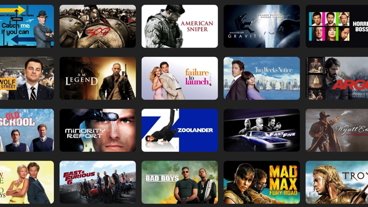Jobs: Apple TV a hobby because there's no viable market
The existing market for set top boxes is heavily subsidized by cable operators, Jobs said, who "give everybody a step top box for free, or for $10 per month. That pretty much squashes any opportunity for innovation, because nobody's willing to buy a set top box.
"Ask Tivo, ask Replay TV, ask Roku, ask Vudu, ask us, ask Google in a few months," Jobs quipped, taking a pessimistic shot at Google's recently announced plans to put Android in a series of TVs and set top boxes. He noted Sony and Panasonic have already tried as well.
The problem with adding an additional box to users' experience, Jobs said, is that they then end up with a variety of different boxes, each with its own remote and a unique user interface.
"The only way that's ever going to change," Jobs said, "is if you can really go back to square one, tear up the set top box, redesign it from scratch with a consistent UI across all these different functions, and get it to consumers in a way that they're willing to pay for it. And right now there's no way to do that."
Jobs said Apple decided to work on the iPhone over trying to fix television, and again prioritized the tablet with the iPad over television, but that there wasn't any potential to really do anything in the television market anyway.
"The TV is going to lose until there's a better— until there's a viable— go to market strategy," Jobs said. "Otherwise you're just making another Tivo. It's not a problem with technology, not a problem with vision, it's a fundamental go to market problem."
Asked if it made sense to partner with a major cable company the way Apple partnered with AT&T to bring the iPhone to market, Jobs said, "Well then you run into another problem. Which is: there isn't a cable operator that's national. There's a bunch of cable operators.
"And then it not like there's a GSM standard where you build a phone for the US and it also works in all these other countries. No, every single country has different standards, different government approvals, it's very… Tower of Bableish. No, balkanized."
Jobs concluded by saying "I'm sure smarter people than us will figure this out, but that's why we say Apple TV a hobby; that's why we use that phrase."
 Daniel Eran Dilger
Daniel Eran Dilger













 Amber Neely
Amber Neely
 Thomas Sibilly
Thomas Sibilly
 AppleInsider Staff
AppleInsider Staff
 William Gallagher
William Gallagher
 Malcolm Owen
Malcolm Owen
 Christine McKee
Christine McKee









85 Comments
What an odd interview.
The enhanced television experience should be financed the same way as original television, with advertising.
My idea is to set up a network of internet-connected PCs with output to the TV screen. Plug the box between the TV and the video source (satellite, cable, or free over-the-air) and the computer provides free DVR service, social networking, web content, and the ability to fast forward through commercials.
The system could be easily financed by directed advertising by adding a few commercials to recorded or "live" programs. The extra commercials would be unobtrusive, and directed to the location, tastes, and interests of the viewer. Smart marketing would make these commercials the best on TV, and probably desired, recorded, and replayed by viewers.
If interested, see the published patent claims at:
Home computers subsidized with targeted television advertising.
COMPUTER-COST SUBSIDIZING METHOD United States Patent Application 20100058378
See it at: http://www.freepatentsonline.com/y2010/0058378.html
Marc Allan Feldman
I think this is why Sky does so well in the UK. The are nationwide and their set top box has a good consistent UI as well as lots of features. Shame they are overpriced
Hang on... isn't Google TV built into the TV in some cases?
Lets say, hypothetically, that Google TV gets built into every single new TV. I have to wonder if Jobs would have the same opinion.
My idea is to set up a network of internet-connected PCs with output to the TV screen... and the ability to fast forward through commercials
...
The system could be easily financed by directed advertising by adding a few commercials to recorded or "live" programs...
Your idea already has a fundamental flaw unless the commercial skipping is offered as a premium service which the user pays for but then we're back to the beginning again...